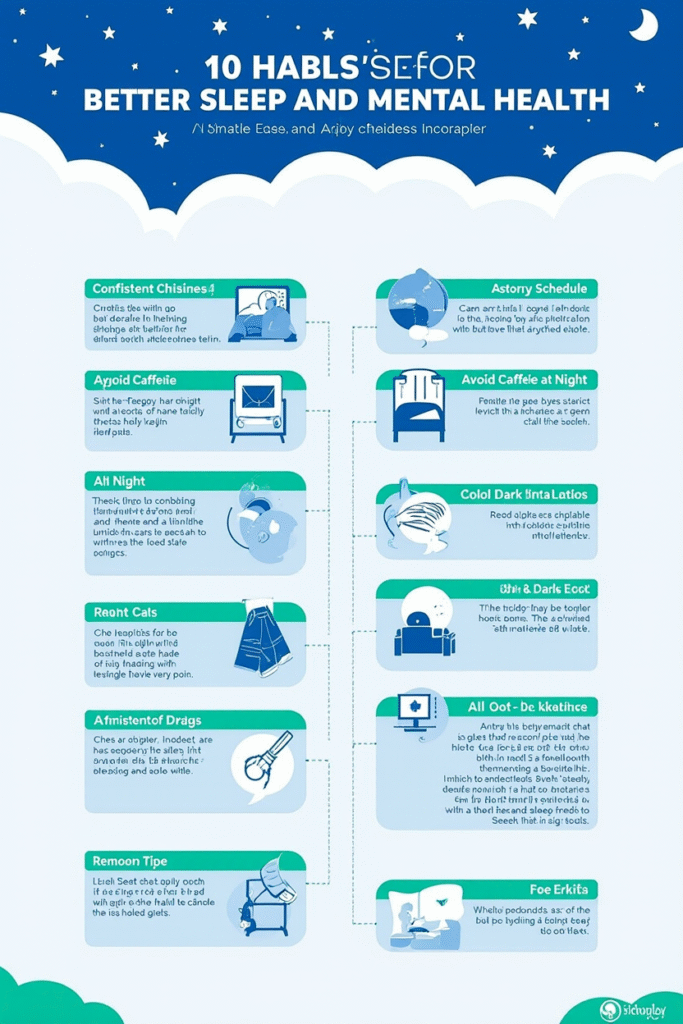Why Getting Enough Sleep Is Essential for Your Mental Health
“Sleep is the best meditation.” — Dalai Lama
Most people treat sleep as optional — something you can skip to get more done. But here’s the truth:
Sleep is a biological necessity, not a luxury. And when it comes to mental health, it’s just as important as diet, exercise, or therapy.
🧠 The Deep Connection Between Sleep and Mental Health
Sleep and mental health are strongly interconnected. In fact, chronic sleep deprivation has been linked to:
- Increased anxiety and depression
- Poor emotional regulation
- Difficulty with focus, memory, and decision-making
- Reduced ability to manage stress
A 2022 study by the University of California found that just one night of insufficient sleep increases activity in the brain’s fear center (amygdala), while reducing control from the prefrontal cortex — the area responsible for rational thinking.
Poor Sleep, Poor Mental Health: A Dangerous Cycle
The relationship works both ways. Mental health issues also disrupt sleep.
For example:
- People with depression often experience early morning waking
- Those with anxiety may struggle to fall asleep due to racing thoughts
- PTSD sufferers may have nightmares or insomnia
- Bipolar disorder is linked with erratic sleep patterns
This creates a vicious cycle: poor sleep worsens mental health, which in turn makes sleep even harder.
📊 Did You Know?
- 🧑⚕️ According to the CDC, 1 in 3 adults don’t get enough sleep
- 💤 Adults need 7–9 hours of quality sleep per night
- 🔁 Over 75% of people with depression report sleep difficulties
🌙 What Is Sleep Hygiene?
Sleep hygiene is a term used for the habits and practices that help you get high-quality, restful sleep.
Good sleep hygiene improves not only your sleep — but your mood, resilience, and day-to-day mental clarity.
✅ 10 Proven Tips to Improve Sleep and Mental Health
- Stick to a Consistent Sleep Schedule
Go to bed and wake up at the same time every day — even on weekends. - Create a Wind-Down Routine
Try reading, stretching, or journaling. Avoid screens 1 hour before bed. - Limit Caffeine and Alcohol
Especially in the evening. They disrupt sleep cycles and REM stages. - Optimize Your Sleep Environment
Cool, dark, quiet, and tech-free. Invest in a good mattress and blackout curtains. - Avoid Heavy Meals Before Bed
Eating close to bedtime can cause indigestion and restlessness. - Keep Naps Short and Early
A 20-minute nap before 3 PM can be refreshing. Longer naps may hurt night sleep. - Get Morning Sunlight
Natural light helps regulate your body’s circadian rhythm. - Practice Stress-Reduction During the Day
Meditation, yoga, and therapy can all lower nighttime anxiety. - Use Sleep-Tracking Apps
Tools like Sleep Cycle, Calm, or Headspace can help identify patterns and improve quality. - Seek Help If Sleep Problems Persist
Ongoing insomnia or fatigue may indicate a deeper issue like sleep apnea or depression. Talk to a doctor or therapist.
📲 Helpful Tools & Resources
- CDC – Sleep & Health Portal
- Harvard Health Publishing – Sleep & Mental Health
- Calm App – Sleep meditations & bedtime stories
- Sleep Cycle – Smart alarm and sleep analysis
- Headspace – Guided wind-downs and sleepcasts
📉 Common Sleep Disorders to Know
Understanding certain sleep disorders may help explain deeper issues:
| Disorder | Description |
| Insomnia | Trouble falling or staying asleep |
| Sleep apnea | Interrupted breathing during sleep |
| Restless legs | Urge to move legs, disrupts sleep |
| Circadian rhythm disorder | Sleep cycle misaligned with natural light |
🖼️ [Infographic Placeholder]

💬 Call to Action
What sleep habit works best for you?
Drop your favorite sleep tip or bedtime routine in the comments. Your insight could help someone sleep better tonight. 🌙
Final Thoughts
Sleep isn’t a luxury — it’s a core pillar of mental wellness. From regulating mood and memory to reducing anxiety and stress, getting 7–9 hours of quality sleep can truly transform your mental health.
Start by building better sleep habits, one night at a time. Even small changes — like turning off screens early or getting more sunlight — can lead to big improvements in how you feel, think, and cope each day.
🛌 Better sleep. Better mind. Better life.